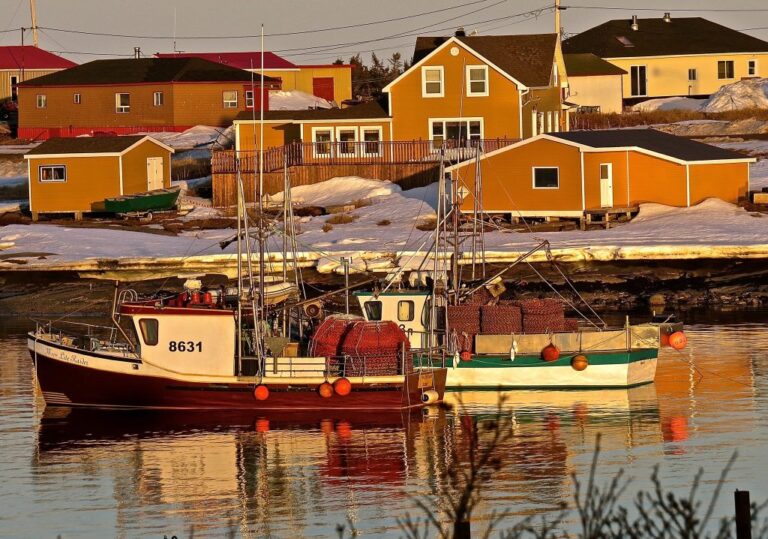Cultural Policy
The MRC du Golfe-du-Saint-Laurent developed this first cultural policy with the objective of acting on the cultural vitality of the region for the benefit of the entire population. A participatory process involving a large number of actors from different backgrounds was deployed in order to propose a clear and unifying vision of cultural development on the Lower North Shore.
The resulting policy allows to sets in motion the subsequent stages of the cultural development agreement agreed with the Ministère de la Culture et des Communications, including the financing and implementation of structuring cultural projects.
The cultural policy was adopted in December 2020.


Message from the Warden
As the warden of the MRC du Golfe-du-Saint-Laurent, I am proud to present our first Cultural policy.
The rich history, majestic beauty and remoteness coupled with the cohabitation of French, English and Innu languages and cultures gives us a uniqueness that is ours to promote.
I would like to thank everyone that was implicated in the process of creating our cultural policy. It is a beautiful thing when we work together.
Randy Jones, Warden
December 2020
Preamble
The MRC du Golfe-du-Saint-Laurent developed this first cultural policy with the objective of acting on the cultural vitality of the region for the benefit of the entire population. A participatory approach involving a large number of actors from different backgrounds was deployed in order to build a clear and unifying vision of the cultural development of the
territory of the Lower North Shore.
This resulting policy makes it possible to initiate the subsequent stages of the cultural development agreement signed with the Ministère de la Culture et des Communications, to finance and implement structuring cultural projects.

Cultural Policy
The Lower North Shore has a population of approximately 3 675 people. Its 14 villages, each of which are home to a few dozen to just over a thousand inhabitants, are spread
over 375 kilometers of coastline.
Economic activities are mainly related to maritime transport, commercial fishing, berry picking and tourism. Most villages are not connected by road, so many communities are only accessible in the summer by sea or by air. During the winter season, the Route Blanche facilitates travel between villages where hockey tournaments are at the heart of the population’s activities.
The presence of two Innu communities and the proximity to Newfoundland and Labrador are at the source of a unique tangible and intangible culture marked by the cohabitation of French, English and Innu languages and cultures.
Cultural Life
The exceptional character of the Lower North Shore territory, the singularity of the way of life of its citizens and the diversity of community dynamics at the level of each village have a significant influence on cultural life. From traditional activities to festive events, from craftsmanship to modern artistic practices, just about every form of cultural expression is coloured by this unparalleled identity.
Seven communities have a municipal library operated jointly with the Centre de services scolaires Littoral and are members of the Réseau Biblio Côte-Nord. In addition to these dedicated spaces, a number of indoor and outdoor spaces, including community halls and churches found in almost every village also host cultural activities.
Practice of the arts
The territory has about ten people with artistic practices recognized by their peers. These artists are active in the fields of music, painting, photography, literature and arts and
crafts. They practice their activities on an individual basis. To date, there is no formal group or collective.
Cultural leisure activities also constitute, from a young age and throughout adult life, a privileged access to culture. The performing arts are a popular activity among school-age youth. Several amateur music groups are also present and they contribute to the dynamism of various events, including winter hockey tournaments.
Heritage and Museology
The Lower North Shore has several heritage sites of interest recognized by the Ministère de la Culture et des Communications (MCC). These sites include only one movable
heritage site, the wreck of Dog Island in Bonne Esperance, as well as 32 immovable heritage sites, five of which are protected by a MCC designation.
Nine museums and interpretation centers showcase local history and heritage. These are characterized by seasonal schedules, only during the summer, corresponding to the tourist season made possible by the M/V Bella Desgagnés’ sea service. Only the Île-Providence Interpretation Centre is linked to a protected heritage site. Finally, the Jacques-Cartier Trail highlights the natural and cultural history of the region through a series of interpretation panels spread across the Lower North Shore.
Media and multimedia
The Lower North Shore has four community radio stations, including one Innu radio station. These are an essential source of information for the communities since they are the only media present on the territory and high-speed Internet has not yet fully deployed on the territory.
The radio stations thus contribute to the vitality of the communities by acting as a relay
between the various actors and the population of their respective territories. The recent
closure of CFTH radio in Harrington Harbour means that this sector is no longer served by a local radio station.
The guiding principles reflect the important values of the different cultural actors on the Lower North Shore and provide guidelines for prioritizing projects.
1. Citizen participation in cultural vitality
The people of the Lower North Shore contribute to a unique and diversified culture. It is
therefore essential to consider and support the participation and involvement of citizens
in cultural activities.
2. Recognition and enhancement of territorial particularities
The Lower North Shore territory is both a source of inspiration and a constraint for the cultural vitality of its inhabitants. The omnipresence of an immense nature and the unique relationship to it are elements that must be considered and valued for the support and creation of structuring cultural projects.
3. Dynamic collaboration between communities
The spirit of solidarity is an important element for the citizens of the Lower North Shore. Collaboration between the different cultural and linguistic communities, i.e., Francophone, Anglophone and Innu, thus appears as a natural principle to promote the realization of projects that are both unifying and far-reaching.
4. Local and regional structuring partnerships
The many partnerships already in place between organizations from a wide variety of sectors contribute to the realization of projects for the vitality of communities, particularly at the cultural level. The consolidation of existing partnerships and the establishment of new collaborations are essential to achieving the objectives of this policy.
The culture of the Lower North Shore is celebrated for its uniqueness, its diversity and the strong community spirit on which it is based.
The orientations and objectives of the cultural policy represent the intervention priorities within the framework of the Cultural Development Agreement. Supported projects must
meet one or more of these collectively determined priorities.
1. Stimulate cultural production on the Lower North Shore
Many cultural practices rely on informal activities, including the oral transmission of traditional knowledge. The structuring of these activities aims to stimulate the
production of cultural content representative of the people who make up the uniqueness and diversity of the Lower North Shore.
Objectives :
1.1. To encourage the population to engage in cultural activities;
1.2. Support the documentation of intangible heritage;
1.3. Encourage citizen involvement in cultural production projects.
2. Foster access to a dynamic and diversified cultural offer
Many venues and opportunities have the potential to increase the frequency, scale, quality and accessibility of cultural activities and events. Appropriate support for the actors involved is essential in this regard.
Objectives :
2.1. Facilitate consultation and coordination of cultural projects;
2.2. Support existing initiatives for access to culture;
2.3. Promote the cultural enhancement of various community gatherings.
3. Support the dissemination and influence of local culture
The culture of the Lower North Shore must disregard the distance separating it from the rest of Quebec and its promotion must be based on what makes it unique: the
people who make it up.
Objectives :
3.1. Promote belonging and pride in the culture of the Lower North Shore;
3.2. Increase the online presence of the Lower North Shore culture;
3.3. Encourage the professional recognition of artists.
4. Diversify the tourism offer by highlighting the culture of the Lower North Shore
Intangible heritage and current artistic practices have a significant potential for enhancement through the tourism offer. However, this should benefit both external
visitors and local populations.
4.4. Support the enhancement of culture-related tourism activities;
4.5. Promote cultural activities through the tourism offer;
4.6. Facilitate the accessibility of citizens to the enhancement of heritage.
This policy applies to all Lower North Shore communities, their citizens and organizations in all sectors of activity, including the municipalities.
Through the development of a three-year action plan, the MRC du Golfe-du-Saint-Laurent, in partnership with the Ministère de la Culture et des Communications, will plan and prioritize the actions required to implement the cultural policy. It will be the responsibility of the MRC, in partnership with the municipalities to ensure the follow-up and execution of the action plan.
The cultural policy of the MRC du Golfe-du-Saint-Laurent is under the authority of the Council of Elected Officials of the MRC. The general management of the MRC is responsible for its implementation.
Adoption : Resolution No. 2020-12-04
Coming into force : 2020-12-03
Revision : 2026
